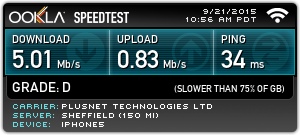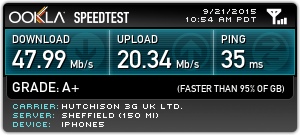Ditto. Those numbers are insane to me. I manage with a theoretical 15 Mbps down and 800 Kbps up (usually closer to 12 M / 600 k in reality) and those results are like something from another world. I can’t even conceive of what’s it’s like to operate at speeds like that.
Yeah I have 150mb line and that seems too much for what I need nowdays. I would have always craved more but I think 100mb+ is enough even with big downloads as the restriction normally likes with the place you are getting the download from, I mean ESO took ages as their sppeds are so slow.
I am totally and completely happy with my 60/5. Everything I do seems virtually instant. I can have a 7 GB game downloaded and running from Steam in 20 to 40 minutes, which still seems absurdly fast to me.
And yet, would I pay extra for 684/879?
Yes. Yes, I would.
How much more would I be willing to pay? The fact that I don’t know frightens me.

I <3 Gigapower.
So just got this installed today. $110/month for the first year. I’m not entirely sure what I’m going to do with all this bandwidth. The latency drop from about 14 ms -> 3 ms was unexpected.
We have a new high score!
I just moved out of Irvine a couple of years ago, just 10 miles away, and now I find out they are very likely to get Google Fiber. They probably wanted a high rate on subscriptions and I imagine they will get that there.
Not that I guess it matters, my ethernet cables in the house don’t support much more than 100Mb/s to begin with, and my current cable modem can almost saturate it.
And still I am jealous. Like burning hatred in my gut jealous. It’s not even rational!
Jeebus you guys are getting ripped off on your connections. Most of you Americans anyway. Prices like that, it’d be torches and pitchforks over here. I work for an ISP over here and I always have to shake my head in wonder just how the big American ISPs can shaft their customers at will. Some stuff that is routine over there would be an instant firing offense where I work.
I have a 50 Mbps down / 10 Mbps up cable modem for 15 euros per month, which is the slowest one they have. For 20, it’d be 100/10 and for 30 euros per month, 350/20. The actual data rates would be within 80% to 100% of advertised. Those prices are for fixed term contracts, without a fixed term contract they would be 30, 35 or 45 euros per month. Oh, and each of these comes with a free unlimited data cap 4G mobile broadband subscription on the side. The ISP doesn’t sell anything but double packages (fixed broadband + 4G mobile broadband). Too bad my tablet only does 3G, it’s an ancient piece of junk (1st gen Samsung Galaxy Tab 10.1).
If I took a VDSL connection from my employer, I’d have 100/10 Mbps, but it would cost more. Or if I took a VDSL from the third operator whose pipes we have in this building. I’m fairly spoiled for choice.
OMG i had to use 3.0 mbps down dsl today at a client’s house.
1gb patch took 45min to download.
It’s pretty simple, really: in any given market, there’s usually two, maaaybe three providers, tops. And while they’re competitors in the sense that they are both capable of providing internet service (and generally TV), they’re not direct competitors because each one owns 100% of that type of network: phone or cable. And since phone-based internet and cable-based internet have some meaningful technical differences, if you’re looking for a specific type of internet (probably cable, at this point), you actually only have -one- choice. And either way, the policies tend to be nearly identical so there’s no ability to support better policy with your dollars. How did we allow this? Um, well, that’s a good question, but I suspect it has to do with anti-regulation political sentiment and these being very large, wealthy companies with very strong lobbying presence.
That said, we also have a much older service infrastructure than in some parts of Europe (especially the parts that saw a lot of infrastructure damage in WWII), and are a much more spread out country with different logistical challenges.
Stronger regulation with direct emphasis on squashing anti-competitive practices and local loop unbundling is the way to go. Finland is comparable to several individual states in the US in terms of population and its density spread, so it is a very good case study on how to do things.
The problem in the US is getting the authority to bring down the regulatory hammer and then using it. I’ve had some conservative Americans screaming socialism at me when describing how we did things here before some of their compatriots who actually knew how this shit works whacked them over the head with a clue-by-four. But that’s the hurdles you’re dealing with on the political level and tehy ain’t coming down anytime soon.
One way to provide cheap coverage over wide areas would be with fiberlinked 3G/4G base stations. You can cover a lot of territory with a star/radial network design where you just need the cable/fiber run to the stations to handle the traffic while end point connection would be with the 4G replacing local loop. Cheaper to maintain than the old local loop phone lines too. That would also open up the local markets to competition by several telecoms companies.
Problem in the US is most municipalities award exclusive contracts to a single company. And if you’re in a smaller town, you’re SOL.
I’m in a town with about 7,500 people. But a large percentage of the population work for tech companies like Microsoft, Amazon, Boeing, Google, SpaceX… So there’s demand here for decent Internet speeds.
There are two contracts with the city here, one for DSL and one for cable.
My awesome Frontier DSL performance:

For cable, down in Redmond they have Comcast/Xfinity 1Gb speed, and I just want to slap coworkers when they bitch about Comcast’s horrible customer service. Because the cable option here is Wave, a rural cable company that promises 50Mb/s, actually deliver 2-5Mb/s during prime time, and goes down in parts of town multiple times every month from the reports I see on Facebook and our town discussion list at work. I’d rather have shittier DSL speeds that are consistent and up over 99% of the time (they’ve had 3 brief outages total in the 11 years I’ve lived here) vs. cable that’s all over the map speedwise, sometimes slows too much to stream Netflix, and goes down frequently.
Given the demographics here, we could make it worthwhile for a Comcast or a fiber company to deliver service, because a dramatically higher percentage of the 7.5K people here would sign up for fast, reliable Internet than you’d see in a typical town our size.
But Wave and Frontier have their exclusive agreements with the city, so the only way anyone else could come in would be to buy them.
Sucks. 'Merica!
3G/4G might be a good alternative technically, but the companies that provide these services have gotten accustomed to charging through the nose for it because of years of milking mobile data users. Low usage caps and high base/overage prices are the norm. Low-end competition is helping, but it’s still ridiculous the prices we see for wireless data service compared to our also-outrageously over-priced/under-powered cable and DSL services.
We’re also seeing some companies that are capable of providing both (phone companies like AT&T and Verizon) beginning to abandon copper networks so they can push people to wireless services where the profit is significantly higher and the networks are easier to maintain. And as malkav noted, cable companies heavily lobby the government at all levels to push through legislation that prevents local competition.
There’s some hope with companies like Google expanding their fiber service and a few municipalities that have successful fiber networks. In every market that Google has committed to enter, there’s an immediate response from the incumbent service providers who raise speeds and/or reduce fees.
Replaced my Hyperoptic supplied router with an Asus AC68U.
Wired:

WiFi 5Ghz:

I hate you, GingerYellow.
And yeah, except for pings, my LTE service here is faster than my actual wired broadband. But data caps/charges per gigabyte make it impractical for home broadband. And my guess is they wouldn’t have the capacity to support it if everyone started using it that way.
Dang GingerYellow. I guess I’m back down to 2nd place since you are beating me on ping and upstream. FYI, I’m on an asus rt-ac66u.
I wouldn’t bother with DSL if I lived alone:


Same location via 4G:


Luckily I’m on a grandfathered tariff the cellular company no longer offers with unlimited tethering, so if I need to download big files I do it via my phone.
If it makes you feel any better, that wireless speed is what I get in the living room on my laptop, with a more or less clear line of sight to the router. In the study where my main PC is, I “only” get 212 Mbps down on WiFi. Which is a bit disappointing given what I know it can do, but still much better than the Hyperoptic router. Not least because it was 2.4GHz only, and there are a bunch of other 2.4 GHz signals in my building. Fortunately it looks like I’m the only person on 5 GHz, so I don’t have to worry about interference.
There is something so fundamentally wrong with this – esp. given spectrum scarcity vs. wired capacity – that I’m not even sure where to go… sigh
I finally got tired of paying Comcast $80/mo. for broadband, so I called to reduce my package. I could get 5 Mbps/mo. for $50 or 25 Mbps for $70. Fuck you Comcast.
For cities this is certainly the case. However I’m in a semi rural location with relatively low population density - I think 4G broadband could make sense here, unfortunately no one offers a reasonably priced unlimited package.
Broadband in the UK is sadly going backwards in terms of competition. After years of successful LLU dsl the incumbent is back in the driving seat for “next gen” services. Result is a slow roll out (my area has been “coming in six months!” for the last two years…) of an expensive compromise technology (VDSL fibre to the cabinet) that will only offer an incremental upgrade for many.
Cable companies have exclusive cable rights to their territories. Until legislation is passed that forces cable companies to lease their cable lines to competition, we’re stuck with whoever we have.
We’re lucky in St. Louis because we have Charter and the speed is 100 Mbs for $39.99, and that includes a free cable modem. I know Time-Warner gives you 15 Mbs for $39.99 and charges another $8 for the modem.